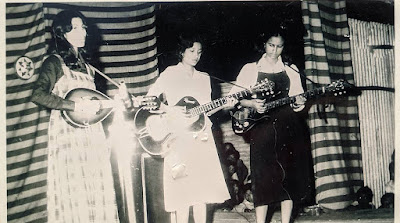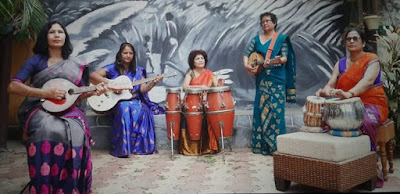In 1979, five teenagers from Nagaon formed a music band. Four decades later, a documentary tells the story of their quiet rebellion, one that led to the making of Assam’s first all-girl band.
The year was 1979 and Assam was on the brink of a movement that would come to change the course of its contemporary history. In this season of protest, five teenage girls met in a room in Nagaon, their mandolin, guitar and a pair of bongos in tow.
They locked the doors, bolted the windows and drew the blinds to keep the music they made a secret from the world outside.
A few months after their first practice session, the girls — all between the ages of 15 and 16 — found themselves on stage in front of a boisterous crowd at a Puja pandal. “Girls are playing”, an incredulous member of the audience said. In the cacophony that ensued, the band members were certain no one heard their music. But it gave them enough confidence to give themselves an identity and a name: Sur Samalaya, or a medley of melodies.
Four decades later — Anjali Mahanta, the one who had got them together — chuckles at the memory. “We were young, rebellious and we wanted to do something different, something no one else was doing,” she says.
 |
Sur Samalaya, an all-girl band, at one of their performances in the 1980s. (Photo courtesy: Anjali Mahanta) |
And they did. Today, Mahanta, her sister Arati, and their three friends, Kabita Nath, Sewali Lekharu and Nazma Ahmed, are the subject of Breaking The Silence, a 30-minute documentary on Assam’s first all-women modern music band.
A musical evening
Like many small-town stories, Sur Samalaya’s too would have gone untold –– if it were not for an invite Parthajit Baruah, a Nagaon-based filmmaker, received in 2019. “It was for a musical evening at the town’s local auditorium,” he says, “I went not knowing what to expect, but what I saw astonished me.”
On stage was a group of five Mekhela sador-clad women, in their fifties, each holding a different instrument: a guitar, a mandolin, a tabla and a congo. The sight wasn’t all, Baruah remembered being amazed at the energy. “Each member had a signature move on introduction — not a bow or a namaskar, but a drum roll, or a guitar strum, with a flourish,” he recalls.
The following week, Baruah approached Mahanta. “I did a little digging and realised that they were possibly Assam’s first organised all-women band,” he says. “While it is true that women were part of orchestras in the 1940s and 50s, none were organised efforts.”
Intrigued, he requested time with the other band members. “The more I learned about them, the more I wanted to make a film. I realised that this was not just a story about music, or the fact that they could have been the first band— it was a story about five young girls fighting odds to do something they wanted to,” he says.
 |
The five women, each playing a different instrument. (Photo courtesy: Parthajit Baruah) |
The film, produced by Sunlit Studio, features a series of interviews in Assamese, with the women speaking about the challenges of forming a band in the 1980s, as well as a glimpse into their daily domestic lives today. You see Ahmed, now a 56-year-old living in Guwahati, practising the drums after a day at work, and talking about the trouble she faced from orthodox members of her community when she joined the band. “But I did not care,” says Ahmed, who now works in the Assam Secretariat, “I would put on my bell-bottoms, get on stage and sing Dum Maaro Dum — the crowd would go crazy. That made up for every negative comment I received.” Then there is Nath, who proclaims she is “married to the guitar” and lives in a home adorned with The Beatles posters.
“I made it a point to bring in their domestic lives — none of them have broken out of the social system, they have families, jobs, lives and yet managed to hold on to their passion,” says Baruah, who is a graduate of Film and Television Institute of India, Pune.
A reunion
In the early 80s, Sur Samalaya became a favourite amidst the Assam Agitation, the anti-“foreigner” mass movement that brought life to a standstill in the state for six years. “People came to know that there was a ‘girl’s band’ from Nagaon, and they would invite us to perform at protest meets, where we would sing Bhupen Hazarika’s songs,” says Ahmed.
Adds Mahanta: “This was our way of contributing to the movement of our times.”
 |
The band — arguably Assam’s first all-girl group — was formed in 1979. (Photo courtesy: Anjali Mahanta) |
While the band played regularly for a decade, the early 1990s saw the members go their separate ways. “Some of us got married, some moved towns, some got jobs,” says Mahanta, “And that was the end of our band.”
But, in 2010, she learnt of Hurricane Gals, an all-girl rock band from Assam. “It made me think of our own band, and on a sudden burst of inspiration, I tracked down my bandmates whom I had lost touch with,” she says. Would they like to regroup again?
“Of course, we did,” says Lekharu, the band’s guitarist, who runs a business in Guwahati “Just because I was married and a mother of two, that wasn’t going to stop me.” Ahmed, too, remembers almost shouting in delight when she received Mahanta’s call. “I told her — Anjali, what a blessing this phone call is. When can we start practising?”
In the last decade, the women have shuttled between Nagaon and Guwahati for weekend practice sessions, and performed locally in events, where only the neighbourhood would show up. “That’s where Partha da saw us — and now, there is actually a film on us. Who would have thought?” asks Ahmed.
(Source: The Indian Express)
No comments:
Post a Comment